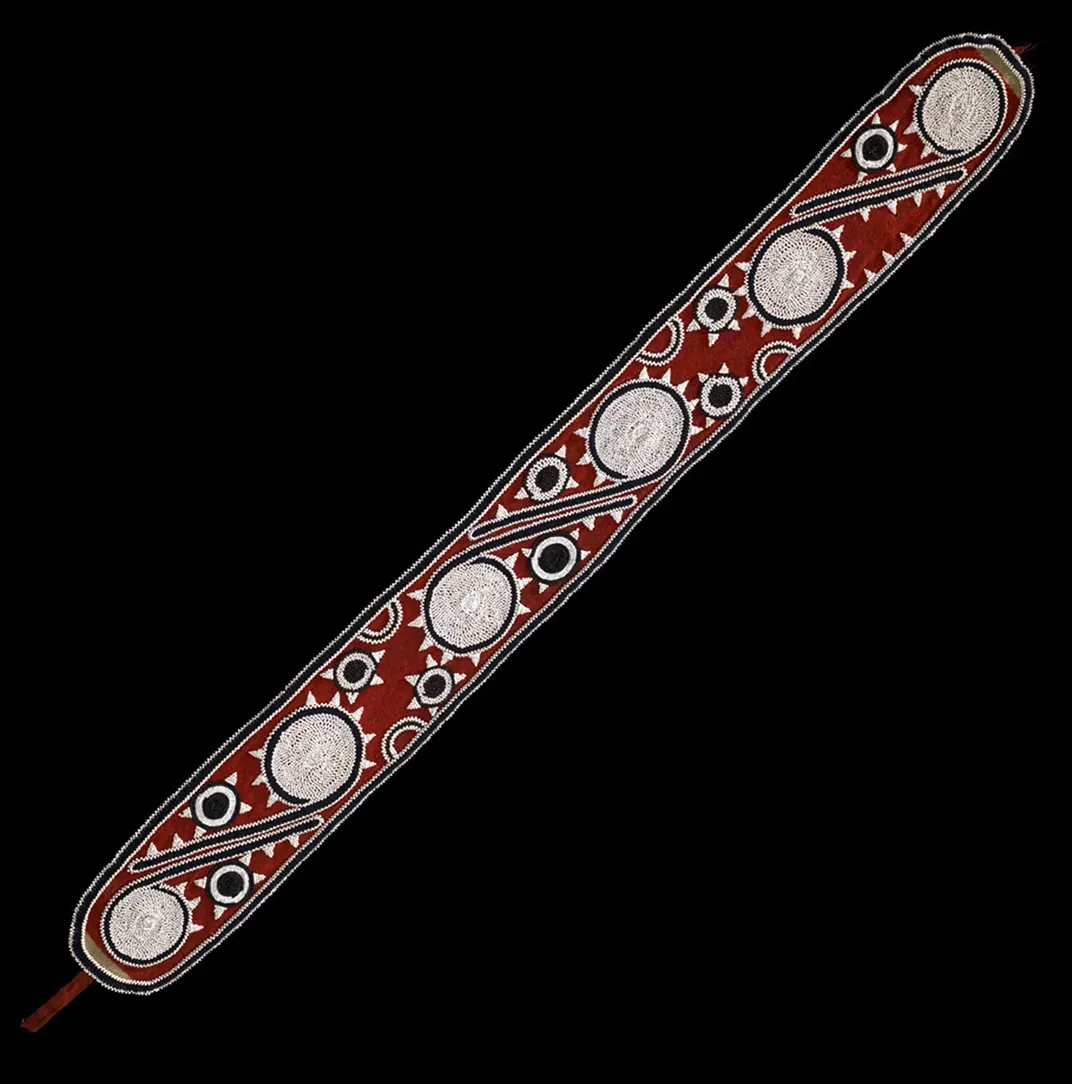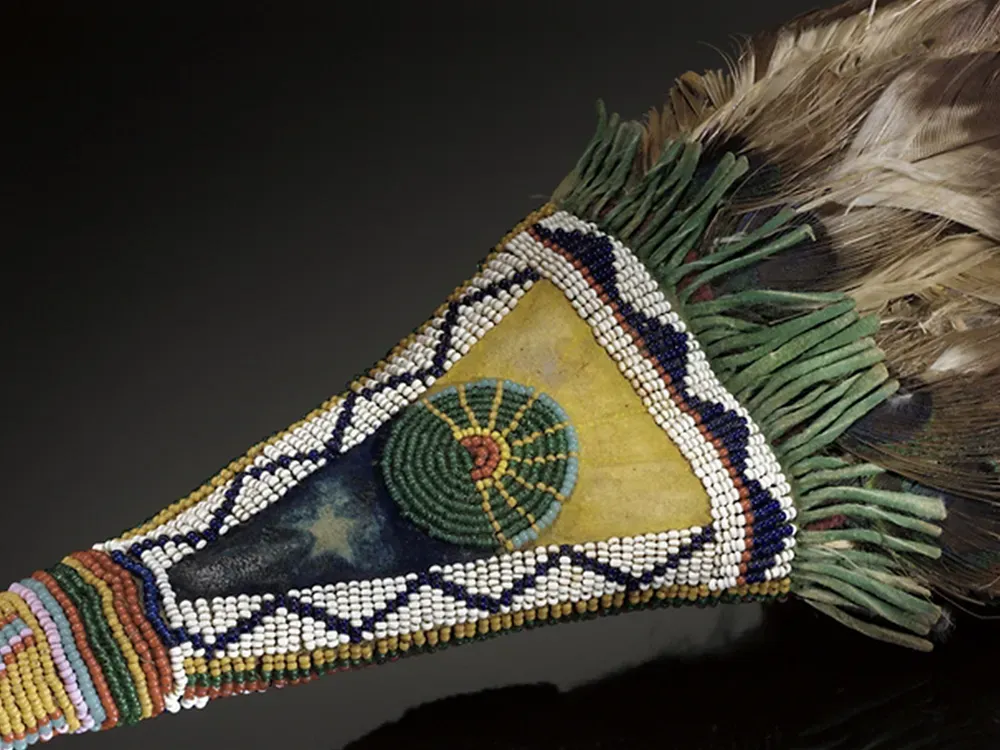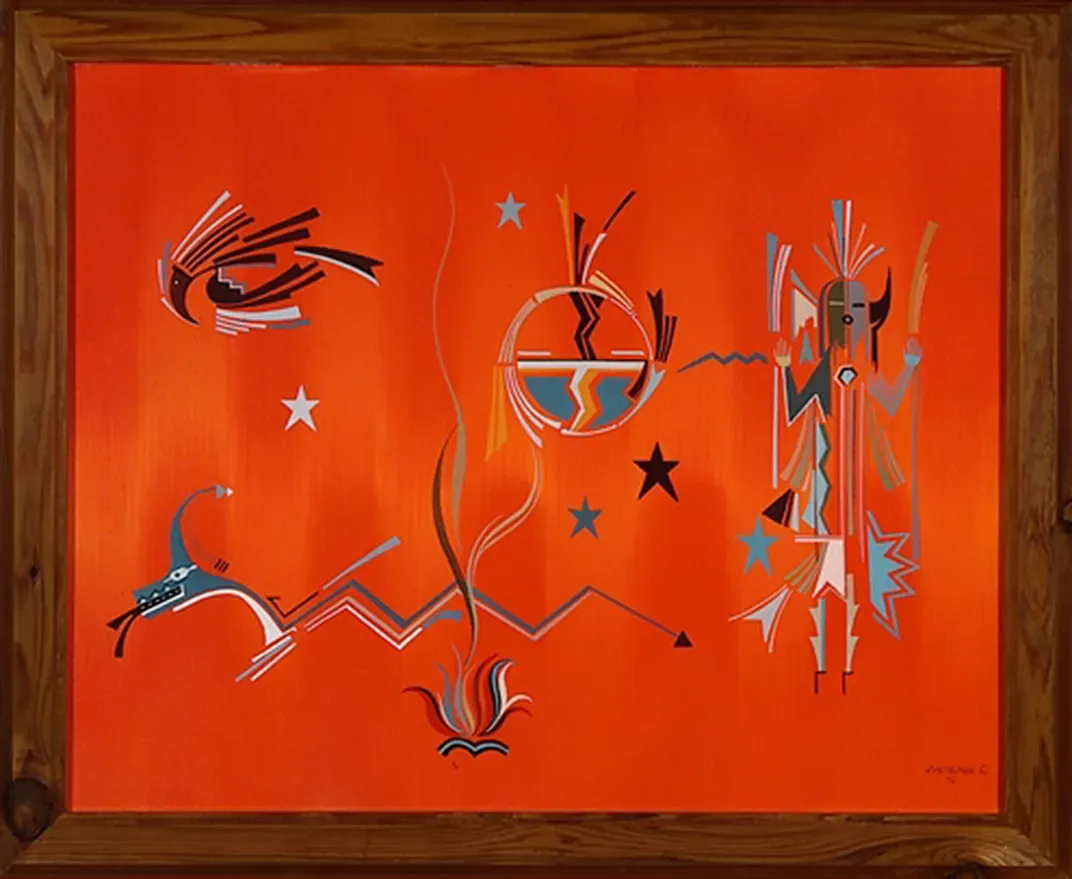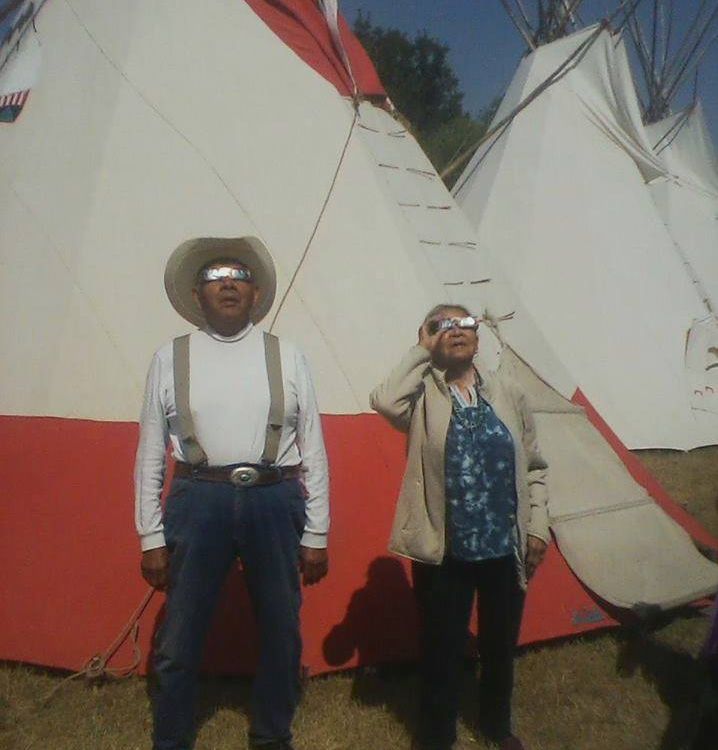:focal(359x480:360x481)/https://tf-cmsv2-smithsonianmag-media.s3.amazonaws.com/filer_public/f8/55/f855020f-f333-478e-95a9-c9251adf8447/eclipse_1.jpg)
Used with permission from Diane H. Real Bird
The National Museum of American Indian has received numerous inquiries concerning the upcoming eclipse. Part of the museum’s mission is to provide a forum for Native people’s voices, so we went to the Internet to ask, “Does your tribe have any beliefs or protocols concerning the eclipse?” Here are some replies from the original 2017 publication with new responses added. The correspondent’s Native affiliation (and where he or she is living now) appears ahead of their quote.
Laguna–Acoma Pueblo (New Mexico): “My Chacoan and Mesa Verde ancestors were astronomers. They marked Halley’s comet, we watched the sun, and we predicted eclipses. The Sun Dagger at Chaco Canyon is a prime example of the science of my Puebloan ancestors. I asked my elders recently of any taboos with eclipses. I was told that they are a time of transformation and not to fear them. Those in our tribe who feel fear have done something wrong. They told me to pray with cornmeal, respect the silence, and accept the transformation coming.”
David Lee, Diné (Navajo) 1968, Sun With Rays. Shiprock, Navajo Reservation; San Juan County; New Mexico; USA, 24/2963. National Museum of the American Indian, Smithsonian/https://tf-cmsv2-smithsonianmag-media.s3.amazonaws.com/filer_public/7b/7d/7b7d72a7-8162-459d-a6e7-58fb9906baa2/eclipse_5.jpg)
Southern Paiute (Nevada and Arizona) “The eclipse is a reflection of love for the Nuwu (Southern Paiute). There is no taboo by looking at the eclipse other than watching the sun and moon come together in the embrace of making love. It is a special day to reflect on what love means to you, to remove any anger you may have and do a deed of kindness and an act of love. It is a day of giving, of life, of love, for without the sun and moon we would be in misery just as our legend tells us.
At one time our world was filled with darkness. The beings (animals and humans) slept most of the time, and when they were hungry could not find food to hunt in the dark. Tahvah the sun only came out when he wanted; he did not feel he had to work so hard and just wanted to give up all together. The people became angry and gathered to meet. Soonungwuv (coyote) heard of this gathering and went to talk to them.
They told him how they felt and asked why the sun does not come out longer. Soonungwuv explained that Tahvah was lonesome, he had no wife to love him and was lonesome most of the time. The beings all agreed they would help find a wife for Tahvah.
There was a maiden among them who had no husband, so the chiefs brought her to Soonungwuv. He took her away and turned her skin into gold and rubbed it until it shone brightly, and she was very beautiful. He then took her to Tahvah, and she became his wife. Tahvah was very happy now and proud of his wife. One day he said to Soonungwuv, “My wife shines bright like me, but I wish she were round like me too.” So Soonungwuv, turned his wife into a big round ball. Tahvah worked more regularly and willing now and he talked no more of quitting his work. He began his journey across the sky very early so he could hurry back to his wife. That is how tooweap got twilight.
One day the wife said to her husband, “Let me go back to my people for a little while. I want them to see how beautiful you have made me.” Tahvah said, “All right, you can go but hurry back for I will be lonesome.” She had never seen how she looked, but Soonungwuv and her husband had told her she was very beautiful, and she wanted to see for herself. She rubbed herself all over as Suhnuv had done until there was not a dull spot on her, then she started back to visit her old home and her people. When she reached her people, she wanted to play a trick on them so she jumped over their heads and village and dodged among them but they became very frightened. They could not understand it as they did not know it was her. They ran in all directions and when she called to them to stop, they ran only faster. That made her angry and when her people would not stop or come to her, she jumped on them and killed them. In and around the village she went, smashing their homes and killing all the people she could see.
A great cry went up to Soonungwuv to come and stop Tahvah’s wife. Soonungwuv came and sent her home. When she was gone the beings begged Soonungwuv to kill her for they were afraid she would come back and hurt them. Soonungwuv said, “No, if I kill her, Tahvah will quit work. I will take care of it and talk with them.” Soonunngwuv went to talk to Tahvah and his wife and returned to tell council, “Yes, Tahvah’s wife must pay for what she has done. I will give her some of the darkness that is on tooweap and she must give you some of her light to guide you in the darkness. She shall be like the night bird, always traveling in the dark. Tahvah will travel across the sky as he has always done, and she will have to travel across the sky through the night.”
They replied, “But we will still fear her, she might see us and want to jump on us again.”
Soonungwuv said, “I will see to it that she does not, by making it so she is never full for very long & she cannot bounce any more. She will start out as a thin light just as she was when she was given to Tahvah, every night she will grow until she is full just as her husband had wanted and this will make her happy to see how beautiful she looks. She will not want to harm her people when she sees how she is helping them, and they see how beautiful she is shining down on them.
“Her name shall be Mah tohots, the moon, and you can count time by her movements. Begin when she is thin and starts to grow, after she has grown full and back to thin again, that will be one measure of time. Call this one moon and the moons will always be the same. There will be 12 moons of time and you can give them twelve names so you will know the different seasons. Tahvah will bring light into his wife Mah tohots, and this will make him happy so he will not quit work and be lonely and tooweap will have both light and darkness so all living beings will be more at ease.”
As Soonungwuv promised the living beings on tooweap long ago, so it has been to this day. Mah tohots is still the wife of Tahvah; he travels all day, and she travels at night. Toovuts (Wolf) made it so they can be together and yoho (make love) when they need it and to also bring love to the people who have forgotten what love is when anger and unrest has taken over their minds, just as it had done when darkness was across tooweap. This is a time to be together with your loved ones and forget about the darkness that we have within us. It was the act of love that brought us into this world, and we should never forget this as we witness the act of love between the Sun and the Moon.”
Coushatta sash with scroll and sun designs, ca. 1875. Jefferson Davis Parish, Louisiana. 1/8587. National Museum of the American Indian, Smithsonian
Cherokee (Oklahoma): “Cherokee say it is a giant frog in the sky trying to eat the sun. Everybody is supposed to go outside and make a big noise with drums, whistles, and voices to scare the frog away.”
Shawnee (Kansas): “Our prophet Tenskwatawa, predicted a solar eclipse leading up to the War of 1812. He predicted this to William Henry Harrison, who dared Tenskwatawa to predict the future. He did, and tribes came from all over to hear our Prophet speak.”
Shoshone Bannock (Idaho): “My gramma would close all her windows. She says that’s when bad things happen to bad people. After that, we would drink water that she prayed for. That’s my young recollection of the eclipse, both lunar and solar.”
Hopi (Arizona): “I am Hopi Sun Clan! We pray to our Dawa every morning. During the last eclipse, our nieces and nephews were given their sacred Hopi names—Red Beautiful Sun, New Colorful Sun, and Little Sunboy! It’s very significant to us, a time for ceremony.”
Kiowa (Oklahoma): A Kiowa account of the July 29, 1878 eclipse, “Then we broke camp and moved up west of Granite (Oklahoma) to a place of good timber for the sundance. It was during this time the sun died. It was in the afternoon. It got real dark and you could see the stars. The people were scared and crying and some were making medicine to bring it back. They sure made a lot of noise. So that was the time the sun died.”
Niuam (Comanche) fan with sun and Morning Star designs (detail), ca. 1880. Oklahoma. 2/1617. National Museum of the American Indian, Smithsonian
Kumiai and Yaqui (Maryland): “I was raised outside my traditional community. This is what I was taught by my mother and aunties in Mexico: For pregnant women especially, during an eclipse they are to wear a red sash with a small steel pin or keys and not to go outside at all.”
Nakoda (Alberta, Canada): “Our elders have said that any meteor and lunar activity are omens signifying events that will come to pass. Rings around the sun and moon may indicate significant weather change. Lunar and sun eclipses have deeper representations. This activity represents some natural occurrence to happen on earth.”
Ho-Chunk (Wisconsin): “Was told to respect both sun and moon eclipses. Time of transformation. “
Crow (Montana): “We believe it’s a new beginning. The sun dies and is rejuvenated.”
Pawnee (Oklahoma): “When I was younger, I asked an elder about what an eclipse meant to us. He said he didn’t know much, but he heard the old people talking about how it was a troubling time when one happened. They said it meant a great leader was going to pass on.”
David Chethlahe Paladin (1926-1984, Diné [Navajo], Sun Spirits, 1971. Albuquerque, New Mexico. 25/8436. National Museum of the American Indian, Smithsonian
The Institute for Diné Culture, Philosophy and Government, in Rock Point, Arizona, on the Navajo Nation, received so many inquiries that the staff prepared a detailed reply:
Our Diné people have a completely different definition and perspective on this sacred natural phenomenon. The belief is that the Jóhonaa’éí (Sun) is the male and the Tł‘éhonaa’éí (Moon) is the female. The Sun is the most powerful deity amongst all creation, here on earth and in the universe. The Sun is the epicenter of all creation. Nothing will live or function without the Sun. The Sun controls and regulates the universe, whereas the moon controls and regulates the earth.
The Sun is vested with the concept of and in control of death (anoonééł), and the Moon is vested with and in control of birthing (oochííł). When a solar or lunar eclipse occurs, it is believed that a death occurs. That is the reason why an eclipse is termed daaztsą́, either Jóhonaa’éí daaztsą́ (solar eclipse) or Tł’éhonaa’éí daaztsą́ (lunar eclipse). A death is a very sacred occurrence. There are certain necessary protocols, but most important is the strict and comprehensive reverence in observing the occurrence of death (yéego dílzin dóó hodílzin). During a solar or lunar eclipse, strict and comprehensive acts of reverence must be carried out.
In addition to the concept of death during an eclipse, it is also believed that during an eclipse, the Sun and the Moon are mating. After the passing of the eclipse, when the sun or moon becomes fully bright once again, it is believed that a birthing has just taken place. It is believed that the mating is to give birth to, or renew, the universe and all creation. During this birthing/renewal process, the universe and all creation are reborn, realigned, and there is growth and development amongst all of creation as well.
Due to the very sacredness of death and birth, the reverence required to be shown during an eclipse is very strict and comprehensive (ts’ídá yéego hodílzin). There is only one way to be reverent during an eclipse. No shortcuts exist. We cannot simply smudge ashes or corn pollen upon ourselves and exit our homes and carry on as if it is just another day. The following acts of reverence must be carried out during an eclipse: We must stay inside, preferably in our home; we cannot eat or drink anything, cannot be asleep, cannot brush or comb our hair or wash ourselves, cannot be in an intimate act with our spouse or anyone of the opposite sex, cannot needlessly move around, are required to remain calm and still, cannot look outside, cannot look at the sun while the eclipse is occurring—yes, it also means the shadow of the sun, through a pinhole or other apparatuses; and we cannot be using the restroom.
During the eclipse, we must be in full prayer and reverence. Prayers must be focused on the concept of the Sun or Moon going through an ending, and we are to pray about the ending of bad or evil, or the ending of phases of life. In addition, our prayers must be focused on the birth and renewal that will arrive when the eclipse ends. Moreover, prayers must be about a better future. Most of the time, we pray for and about ourselves and loved ones. It is advocated that prayers during an eclipse must mostly be about this creation: the ending, renewal, and the future of this creation and the divine presence. If we know the songs for use during eclipses, those songs can be sung at that time.
Moreover, during the eclipse, we must always look down at the ground, cannot be looking up or outside. The animals, the insects, the birds will not be active during the eclipse. The birds will not fly; the insects will hibernate; horses and dogs will be calm and look down at the ground.
When the eclipse ends, we will end our prayer and say hózhǫ́ náhásdlį́į́ four times. At that time, we must take our corn pollen (tádídíín) out and use it as an offering to acknowledge our prayer and to acknowledge the sacred phenomenon. The corn pollen will be the first meal taken after the eclipse, just as corn pollen is the first food eaten in a new period of life. We will feel the renewal of life, the rejuvenation of life, the feeling of going on, and a positive outlook of the future.
It is tremendously amazing how our people knew when the eclipses were going to happen through their prayers, songs, and belief systems without technology. Today we have to rely on the media to inform us when these eclipses are going to take place. Our prayers and songs are very powerful.
Our traditional Diné teachings instruct us that if a person does not observe the eclipse in accordance with the cultural protocols that have been outlined here, the nonobserver will certainly develop eye problems. Unexplained sunburns or rashes will develop, digestive problems and unexplained migraine headaches will develop. If a woman is pregnant and follows the proper required protocols, there should not be any problems. However, if the protocols are not followed, prenatal problems may develop, and when the child is born, the child will certainly develop digestive and skin problems. There are ceremonies to put people back in harmony. It requires a two-day ceremony, however, with an overnight portion and sand paintings.
The Diné Institute is merely sharing our sacred and still relevant cultural teachings. An individual always has a choice to observe or not to observe the eclipse. We hope that our brief synopsis has clarified, reaffirmed, or educated our readers about the upcoming eclipse. On behalf of all of our resident Diné Institute Hataałiis and staff, we thank you for your understanding and encourage all of you to keep our cultural protocols alive and sacred by observing the upcoming eclipse in accordance with these requirements. We thank all the school districts and other agencies who concluded that it would be in the best interest of our children and our sacred cultural belief systems to close schools and offices on the day of the eclipse. May the Holy People be with you and bless you.
Reprinted with permission courtesy of the Institute for Diné Culture, Philosophy and Government



